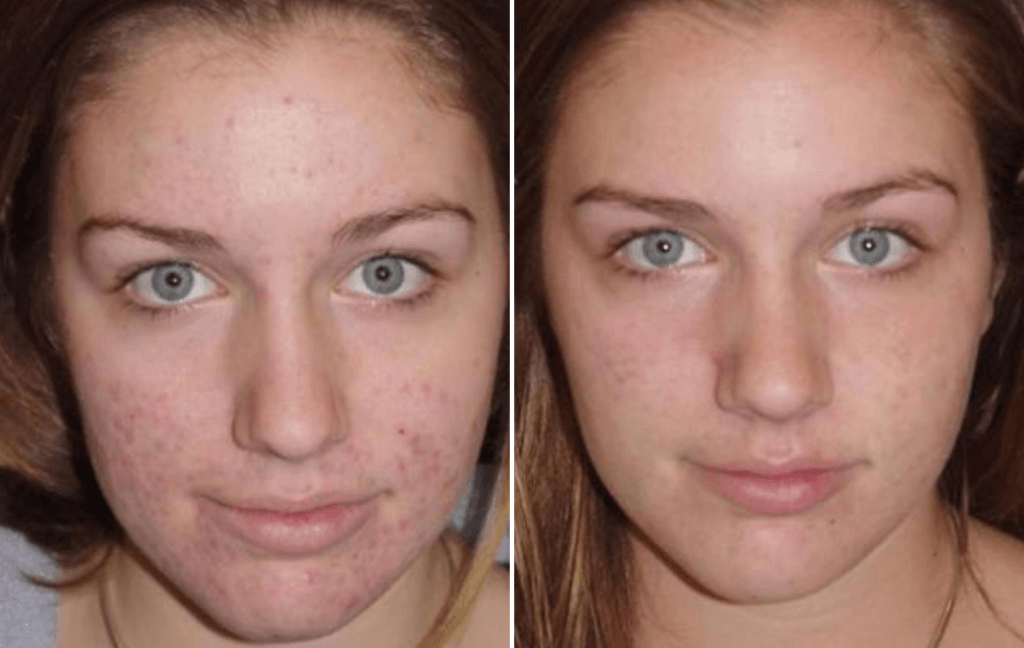Blackheads or breakouts can ruin your day. If acne is a problem for you, a dermatologist can help achieve clearer skin that lasts. If you have tried at-home treatments without success, it may be time to visit Krauss Dermatology and finally get control of your acne.
What is Acne?
Acne is a frustratingly common condition that afflicts over 80% of teens and many adults. Several factors contribute to forming acne, including genetics, hormones, environmental exposures, and habits. Acne occurs when pores become clogged with oil, dead skin cells, and other debris. This material can become food for bacteria that cause inflammation, redness, and soreness. Acne can range from non-inflammatory blackheads and whiteheads to deep, painful cysts with permanent scarring.

What Treatment Works Best for Acne?
Each person’s acne is different, so your acne treatment plan will be unique. Your dermatologist will often begin a treatment plan with easily available treatments, including face washes and topical ingredients. If these are not successful, they may move on to stronger treatments or prescriptions.
Topical Treatments
An over the counter face wash containing salicylic acid is one of the least irritating but often effective treatments. It can be combined with a benzoyl peroxide treatment which should not be stronger than 5%. We recommend giving a treatment six to eight weeks to work before moving on to the next step. This may include topical retinoids for nightly use like Differin® that you can purchase at your pharmacy without a prescription. Stronger topical retinoids require a prescription.
Oral Treatments
Oral treatments may be prescribed if other methods do not control your acne. Prescription medications can include antibiotics like Doxycycline. Your dermatologist might prescribe oral contraceptives, especially for hormonal acne, or a retinoid called isotretinoin (Accutane). Oral medications can be very successful for managing difficult acne and preventing scarring.
Many acne treatments can dry out your skin. Use an oil-free moisturizer and decrease or stop topical treatments if dryness worsens. Retinoids make your skin sun-sensitive, so avoid sun exposure and use consistent sun protection. Medications can have other side effects, so follow your dermatologist’s instructions.
When Should I See a Dermatologist for My Acne?
People with mild, occasional acne may not need a doctor’s help to control their breakouts. However, untreated acne can lead to long-lasting consequences for your skin. You should see a dermatologist if your acne has impacts such as:
- Interfering with your social activities
- Affecting your confidence
- Leaving scars or pigmentation changes
- Not responding to other treatments even after several months of trying
- Causing you stress or frustration on a regular basis
Acne scars and post-inflammatory hyperpigmentation cause skin changes that are difficult to get rid of. Living with your acne can hold you back from enjoying many activities, so seeing a dermatologist can be the first step in regaining your confidence.
“After seeing Dr. Krauss for many years, I can’t imagine trusting my skin to any other doctor. Her experience and expertise, professional and reassuring manner, and her superb judgment and skill, have always produced the best results for me. I’ve referred many friends over the years; they’ve all been equally satisfied”*
Take the Next Step
If you have further questions about acne treatment, we encourage you to schedule a consultation at Krauss Dermatology. Call us at (781) 416-3500 or fill out our online contact form. We look forward to taking care of you.

